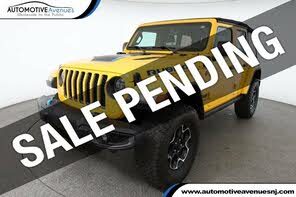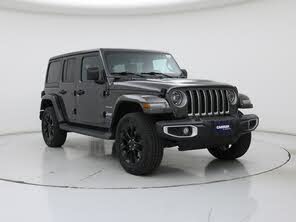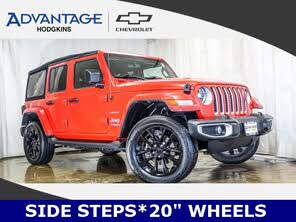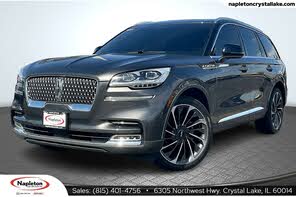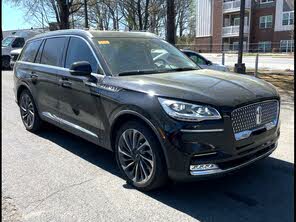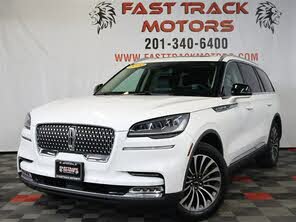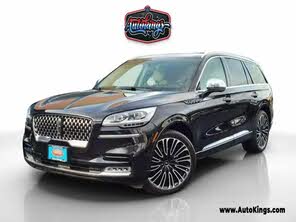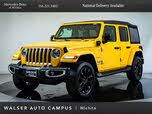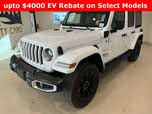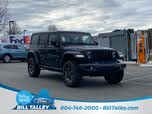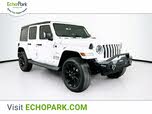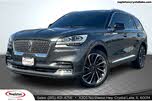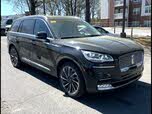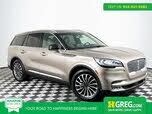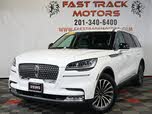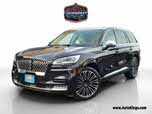2021 Jeep Wrangler 4xe vs 2020 Lincoln Aviator
Overview | |
MSRP$51,100 | MSRP$51,225 |
Average price$34,186 | Average price$31,947 |
Listings499 | Listings895 |
Ratings & Reviews | |
User Reviews | User Reviews |
Expert reviews8.2 out of 10 | Expert reviews6.7 out of 10 |
Pros
| Pros
|
2020 Lincoln Aviator Reviews SummaryThe heyday for Lincoln was more than a half-century ago. Those postwar years of prosperity and optimism were the perfect time for cars like the Continental and others. They delivered comfort and luxury, wrapped in midcentury modern styling. Even as recently as the 1990s, Lincoln was still a popular brand, riding the SUV craze with its Navigator. But after the turn of the century, Lincoln lost its ability to create new designs and looked inward and backward. Sure, retro-themed cars like the redesigned Mustang, PT Cruiser, and Chevy HHR had turned some heads, but none of those came from luxury brands. The BMWs and Mercedes of the world were all looking forward and pushing the envelope for contemporary automotive design. Meanwhile, Lincoln offered the MKX, which was based on the Ford Edge and featured ’66 Continental styling. Neat in a vacuum, but off-base compared to the modern luxury market. This experimental phase with various retro looks coincided with the move to the MK-# alphabet-soup naming convention and big improvements in the Ford lineup, where top-end trims of the Fusion overlapped with an entry-level trim of the MKZ. The combination left Lincoln a confusing, anonymous afterthought in the modern luxury game. But Lincoln is finally ready to change all that. It has a new cohesive design language, its focus is once again on luxury, and the three-letter naming convention that never meant anything to anyone other than Lincoln marketers is gone. The brand led with the 2017 Continental and 2018 Navigator, which are each impressive in their own right. But the company's lineup is growing and now includes the all-new 2020 Lincoln Aviator. Named after a luxury variant of the 2002-2005 Ford Explorer, this new Aviator is also based on the contemporary Explorer platform, but it's a luxury vehicle in its own right. Much of the success of the Lincoln brand may hinge on this midsize, 3-row luxury SUV, so you need to consider its competition, such as the Audi Q7, Infiniti QX60, and all-new Cadillac XT6. Read on to learn if Lincoln’s take on luxury will stand out in a crowded competitive field. | |
2021 Jeep Wrangler 4xe Reviews SummaryIn the history of automobiles, perhaps none captures the go-anywhere and do-anything American spirit quite like the Jeep Wrangler (and its CJ and Willys ancestors). Now, the 2021 Jeep Wrangler lineup offers two new ways to conquer whatever obstacles lay in your path. The first is the V8-powered Wrangler Rubicon 392. The second is the subject of this review, the clean, green, plug-in hybrid electric machine called the Wrangler 4xe. | |
Popular Features & Specs | |
Engine3.0L 400 hp V6 | Engine2.0L 375 hp I4 Hybrid |
Drive TrainRWD | Drive Train4X4 |
Seating Capacity7 | Seating Capacity5 |
Horsepower | Horsepower375 hp @ 5250 rpm |
EV Battery Capacity | EV Battery Capacity17.3 kWh |
MPG City18 | MPG City20 |
MPG Highway26 | MPG Highway20 |
Battery Charge Time (240V) | Battery Charge Time (240V)2.4 hours |
Engine | |
Engine Name3.0L 400 hp V6 | Engine Name2.0L 375 hp I4 Hybrid |
Torque | Torque470 lb-ft @ 3000 rpm |
Horsepower | Horsepower375 hp @ 5250 rpm |
Battery Charge Time (240V) | Battery Charge Time (240V)2.4 hours |
DrivetrainRWD | Drivetrain4X4 |
Fuel Economy | |
EV Battery Capacity | EV Battery Capacity17.3 kWh |
MPG City18 | MPG City20 |
MPG Highway26 | MPG Highway20 |
Interior | |
Seating Capacity7 | Seating Capacity5 |
Key Features | |
Navigation System | Navigation SystemOptional |
Safety | |
Front Crash Overall5 | Front Crash Overall4 |
Side Crash Overall5 | Side Crash Overall |
Dimensions & Capacity | |
Cargo Space18.3 cu ft | Cargo Space27.7 cu ft |
Curb Weight4764 lbs | Curb Weight5000 lbs |
Height69.8 in | Height73.6 in |
Length199.3 in | Length188.4 in |
Width89.9 in | Width73.8 in |
Wheelbase119.1 in | Wheelbase118.4 in |
Maximum Payload | Maximum Payload1200 lbs |
Number of doors4 | Number of doors4 |
Maximum Towing Capacity | Maximum Towing Capacity3500 lbs |
Overview | ||
MSRP | $51,100 | $51,225 |
Average price | $34,186 | $31,947 |
Listings | ||
Ratings & Reviews | ||
User reviews | ||
Expert reviews | 8.2 out of 10Read full review | 6.7 out of 10Read full review |
Pros & cons | Pros
| Pros
|
Summary | The heyday for Lincoln was more than a half-century ago. Those postwar years of prosperity and optimism were the perfect time for cars like the Continental and others. They delivered comfort and luxury, wrapped in midcentury modern styling. Even as recently as the 1990s, Lincoln was still a popular brand, riding the SUV craze with its Navigator. But after the turn of the century, Lincoln lost its ability to create new designs and looked inward and backward. Sure, retro-themed cars like the redesigned Mustang, PT Cruiser, and Chevy HHR had turned some heads, but none of those came from luxury brands. The BMWs and Mercedes of the world were all looking forward and pushing the envelope for contemporary automotive design. Meanwhile, Lincoln offered the MKX, which was based on the Ford Edge and featured ’66 Continental styling. Neat in a vacuum, but off-base compared to the modern luxury market. This experimental phase with various retro looks coincided with the move to the MK-# alphabet-soup naming convention and big improvements in the Ford lineup, where top-end trims of the Fusion overlapped with an entry-level trim of the MKZ. The combination left Lincoln a confusing, anonymous afterthought in the modern luxury game. But Lincoln is finally ready to change all that. It has a new cohesive design language, its focus is once again on luxury, and the three-letter naming convention that never meant anything to anyone other than Lincoln marketers is gone. The brand led with the 2017 Continental and 2018 Navigator, which are each impressive in their own right. But the company's lineup is growing and now includes the all-new 2020 Lincoln Aviator. Named after a luxury variant of the 2002-2005 Ford Explorer, this new Aviator is also based on the contemporary Explorer platform, but it's a luxury vehicle in its own right. Much of the success of the Lincoln brand may hinge on this midsize, 3-row luxury SUV, so you need to consider its competition, such as the Audi Q7, Infiniti QX60, and all-new Cadillac XT6. Read on to learn if Lincoln’s take on luxury will stand out in a crowded competitive field. | In the history of automobiles, perhaps none captures the go-anywhere and do-anything American spirit quite like the Jeep Wrangler (and its CJ and Willys ancestors). Now, the 2021 Jeep Wrangler lineup offers two new ways to conquer whatever obstacles lay in your path. The first is the V8-powered Wrangler Rubicon 392. The second is the subject of this review, the clean, green, plug-in hybrid electric machine called the Wrangler 4xe. |
Video | ||
Popular Features & Specs | ||
Engine | 3.0L 400 hp V6 | 2.0L 375 hp I4 Hybrid |
Drive Train | RWD | 4X4 |
Seating Capacity | 7 | 5 |
Horsepower | 375 hp @ 5250 rpm | |
EV Battery Capacity | 17.3 kWh | |
MPG City | 18 | 20 |
MPG Highway | 26 | 20 |
Battery Charge Time (240V) | 2.4 hours | |
Engine | ||
Engine Name | 3.0L 400 hp V6 | 2.0L 375 hp I4 Hybrid |
Torque | 470 lb-ft @ 3000 rpm | |
Horsepower | 375 hp @ 5250 rpm | |
Battery Charge Time (240V) | 2.4 hours | |
Drivetrain | RWD | 4X4 |
Fuel Economy | ||
EV Battery Capacity | 17.3 kWh | |
MPG City | 18 | 20 |
MPG Highway | 26 | 20 |
Interior | ||
Seating Capacity | 7 | 5 |
Key Features | ||
Navigation System | Optional | |
Safety | ||
Front Crash Overall | 5 | 4 |
Side Crash Overall | 5 | |
Dimensions & Capacity | ||
Cargo Space | 18.3 cu ft | 27.7 cu ft |
Curb Weight | 4764 lbs | 5000 lbs |
Height | 69.8 in | 73.6 in |
Length | 199.3 in | 188.4 in |
Width | 89.9 in | 73.8 in |
Wheelbase | 119.1 in | 118.4 in |
Maximum Payload | 1200 lbs | |
Number of doors | 4 | 4 |
Maximum Towing Capacity | 3500 lbs | |
The 2020 Lincoln Aviator was positioned between the larger Navigator and the smaller MKC (later replaced by the Corsair) in Lincoln's lineup. It marked a return to real vehicle names, moving away from the previous alphabet-soup naming convention. The Aviator featured a unified design language across Lincoln's range, with elegant headlights and a prominent chrome grille. Its tapering roofline and low, wide beltline gave it a sleek, boat-like appearance. Inside, the Aviator boasted a flowing design with soft-touch materials and selective brightwork. The seats were both elegant and sturdy, with shifter buttons resembling piano keys. The cabin was luxurious, with plush leather extending to areas like the dash and door panels. Unique touches included a panoramic moonroof and warning jingles recorded by the Detroit Symphony Orchestra. The Aviator was available in five trims, with the Standard trim offering a wealth of features, and the Grand Touring trim adding a plug-in hybrid drivetrain.
The 2021 Jeep Wrangler 4xe stood out with its unique sound and subtle visual cues, such as a "4xe" badge and sky blue accents. The only noticeable difference from a regular Wrangler was the power port at the base of the windshield. When running on electric power, the Wrangler 4xe was silent except for a pedestrian notification system, which turned heads during our test drive in Yosemite National Park. Our Firecracker Red Rubicon test vehicle, priced at $66,690, was well-equipped with over $13,000 in options. Inside, the Wrangler 4xe retained the classic Wrangler look, with blue seat stitching and special gauges for the PHEV powertrain. The interior was more comfortable than expected, with soft-touch materials and practical controls. The Wrangler 4xe's interior maintained its purposeful simplicity while offering better outfitting than previous models. However, it lacked luxury and refinement, which is typical for a Wrangler.
The 2020 Lincoln Aviator came standard with a twin-turbocharged 3.0-liter V6 engine, producing 400 horsepower and 415 pound-feet of torque. The Grand Touring trim combined this engine with a 100-hp electric motor, resulting in a total output of 494 hp and 630 lb-ft of torque. Both powertrains used a 10-speed automatic transmission, with the base V6 available in rear-wheel drive (RWD) or all-wheel drive (AWD), while the plug-in hybrid (PHEV) was AWD only. Both versions could accelerate from 0-60 mph in about 4 seconds. The PHEV offered smooth and confident acceleration, using electric power at low speeds to enhance the driving experience. The Aviator's steering was light, and its brakes provided cushioned feedback. The Excite drive mode added some dynamism, but the Aviator's 5,600-pound weight limited its sportiness. Fuel economy for the RWD Aviator was 18 mpg city, 26 highway, and 21 combined, while the AWD version achieved 17 mpg city, 24 highway, and 20 combined. The PHEV had a combined fuel economy of 23 mpg, with a 21-mile electric-only range and a 56 MPGe rating.
The 2021 Jeep Wrangler 4xe featured a turbocharged 2.0-liter four-cylinder gasoline engine paired with two electric motors and a 17-kilowatt-hour lithium-ion battery pack. This setup provided 375 horsepower and 470 pound-feet of torque, allowing the Wrangler 4xe to accelerate from 0-60 mph in six seconds. The battery offered an estimated 21 miles of pure electric driving, with a combined efficiency rating of 49 MPGe. When used as a hybrid, the EPA rated its fuel economy at 20 mpg combined, with a total driving range of 370 miles. The Wrangler 4xe had three powertrain modes: Hybrid, Electric, and e-Save. Hybrid mode maximized power or efficiency based on situational needs, while Electric mode used only electric power unless additional power was needed. e-Save mode preserved battery power for specific situations. During our test drive, the Wrangler 4xe averaged 20.8 mpg on a road trip to Yosemite, with regenerative braking helping to recharge the battery. Over a four-day loan, the Wrangler 4xe covered 757 miles, averaging 19.1 mpg.
The 2020 Lincoln Aviator, with its three-row seating, competed with models like the Audi Q7, Infiniti QX60, Mercedes-Benz GLE, Land Rover Discovery, and Cadillac XT6. The optional second-row captain's chairs were highly praised, while the power-closing third row was suitable for adults on short trips and better for kids on longer journeys. With the second and third rows folded, the Aviator offered 77 cubic feet of cargo space, comparable to the Cadillac XT6. However, some controls, like the seat adjustments and door handles, were overly complicated. The 30-way seats with a massage function were worth the effort to learn, but the door-release function was confusing and raised concerns about battery failure.
The 2021 Jeep Wrangler 4xe required some effort to climb into, especially for shorter passengers, but once inside, it offered a comfortable experience. The driving position was classic Wrangler, with a high seating position and clear views over the hood. Manual front seat height adjusters helped find the best position, but the seats tended to lower over time. The center console had limited storage due to the hand-brake and transfer case lever. Rear-seat space was adequate, with air conditioning vents, USB charging ports, a 115-volt power outlet, and MOLLE-style storage straps. Cargo volume was 27.7 cubic feet behind the back seat, with a storage bin under the load floor for the charging cord. The Wrangler's swing-out tailgate and flip-up rear glass window could be inconvenient in tight spaces. Folding the back seat down increased cargo volume to 72.4 cubic feet.
The 2020 Lincoln Aviator came standard with the Sync 3 infotainment system, featuring a 10.1-inch touchscreen in a landscape layout. This setup provided a user-friendly interface for Apple CarPlay and Android Auto, with large icons and readouts. The Aviator also had a fully digital instrument panel and a head-up display, offering a minimalist and unobtrusive way to present information.
The 2021 Jeep Wrangler 4xe Rubicon's technological advancements were primarily related to its plug-in hybrid powertrain and 4WD system. It featured an 8.4-inch touchscreen Uconnect infotainment system with Bluetooth, Apple CarPlay, Android Auto, navigation, and SiriusXM Guardian connected services. A WiFi connection was available, and the Alpine sound system could overcome wind noise on the freeway. However, the Uconnect system showed its age in terms of load time, responsiveness, voice recognition accuracy, and graphics. The Trip Summary data panel provided charging time estimates, and the five blue charging indicator lights on the dashboard were helpful for viewing charging status.
The 2020 Lincoln Aviator came with a full array of front and side-impact airbags, traction control, and a tire pressure monitoring system. It also featured Lincoln Co-Pilot360, which included forward-collision avoidance, lane-departure warning, adaptive cruise control, automatic high beams, blind-spot monitoring, and a head-up display.
The 2021 Jeep Wrangler 4xe offered advanced driving assistance systems bundled in the Safety Group (blind-spot warning, rear cross-traffic warning, rear parking sensors) and the Advanced Safety Group (adaptive cruise control with full-stop capability, full-speed forward-collision warning with automatic emergency braking, automatic high-beam headlights). The blind-spot warning system was highly recommended due to the Wrangler's narrow side mirrors. The LED headlights with automatic high beams were effective but rated Marginal by the IIHS. The Wrangler received a four-star frontal-impact crash-test rating and a three-star rollover resistance rating from the NHTSA. However, it earned a Marginal rating for small-overlap, frontal-impact protection for the driver, with the vehicle tipping over onto its side during testing.
CarGurus highlights
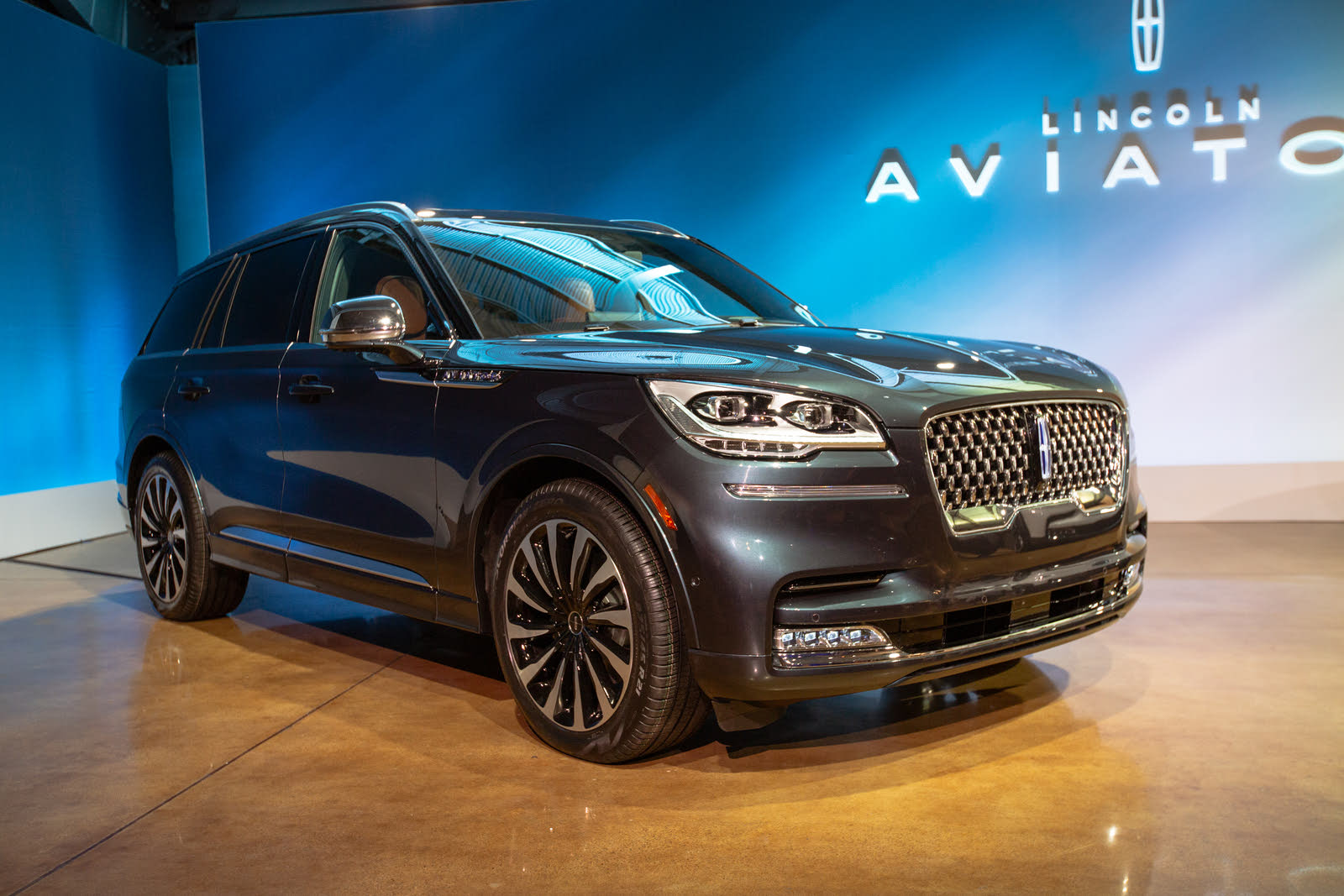
According to CarGurus experts, the overall rating for the 2020 Lincoln Aviator is 8.2 out of 10, while the 2021 Jeep Wrangler 4xe scores 6.7 out of 10. Based on these ratings, the 2020 Lincoln Aviator is the clear winner, offering a more luxurious and comfortable experience, advanced technology, and a powerful engine lineup. The Aviator's higher rating reflects its superior overall performance and features, making it the better choice for most consumers.
Choose the 2021 Jeep Wrangler 4xe if:
- You seek a rugged, off-road capable SUV with a plug-in hybrid powertrain.
- You value a classic Wrangler driving experience with modern electrification.
- You need a vehicle with practical storage solutions and advanced driving assistance systems.
Choose the 2020 Lincoln Aviator if:
- You prioritize a luxurious and comfortable interior with high-quality materials.
- You want a powerful engine with the option of a plug-in hybrid drivetrain.
- You need a three-row SUV with ample cargo space and advanced technology features.
CarGurus highlights

According to CarGurus experts, the overall rating for the 2020 Lincoln Aviator is 8.2 out of 10, while the 2021 Jeep Wrangler 4xe scores 6.7 out of 10. Based on these ratings, the 2020 Lincoln Aviator is the clear winner, offering a more luxurious and comfortable experience, advanced technology, and a powerful engine lineup. The Aviator's higher rating reflects its superior overall performance and features, making it the better choice for most consumers.
Choose the 2021 Jeep Wrangler 4xe if:
Shop Now- You seek a rugged, off-road capable SUV with a plug-in hybrid powertrain.
- You value a classic Wrangler driving experience with modern electrification.
- You need a vehicle with practical storage solutions and advanced driving assistance systems.
Choose the 2020 Lincoln Aviator if:
Shop Now- You prioritize a luxurious and comfortable interior with high-quality materials.
- You want a powerful engine with the option of a plug-in hybrid drivetrain.
- You need a three-row SUV with ample cargo space and advanced technology features.

By: CarGurus + AI
At CarGurus, our team of experienced automotive writers remain at the heart of our content operation, conducting hands-on car tests and writing insightful guides that are backed by years of industry experience. To complement this, we are harnessing AI to make our content offering more diverse and more helpful to shoppers than ever. To achieve this, our AI systems are based exclusively on CarGurus content, ratings and data, so that what we produce is both unique to CarGurus, and uniquely helpful to car shoppers.












